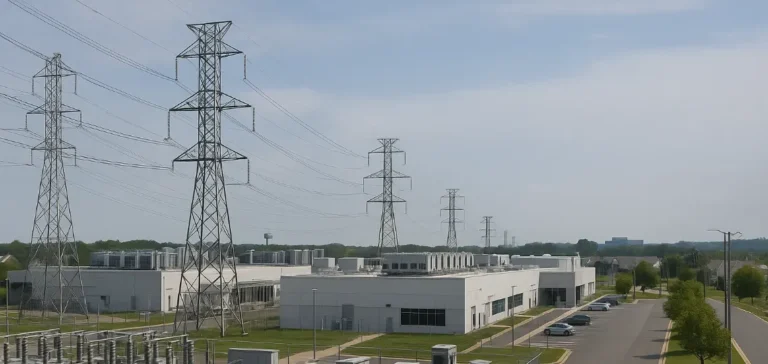The rapid growth of data centres in the United States is driving significant increases in electricity demand, and regulated utilities appear currently better positioned to satisfy it, according to the latest study by energy analytics firm Wood Mackenzie.
Spectacular rise in electricity demand
The report entitled “US power struggle: How data centre demand is challenging the electricity market model” reveals a substantial rise in data centre projects, now totalling 134 gigawatts (GW), up from only 50 GW one year ago. This increase corresponds to a potential 12% growth in overall US electricity demand. Regulated operators appear particularly adept at responding to this rise, due to their vertically integrated model that enables better coordination in planning both power generation and distribution.
Chris Seiple, Vice Chairman of Energy Transition and Power & Renewables at Wood Mackenzie, pointed out persistent challenges in meeting this new demand: “There are bottlenecks for critical equipment, numerous coal-fired power plants are scheduled for closure, and the waiting times for grid interconnections remain particularly lengthy.”
Strengths of regulated utilities
Faced with these constraints, regulated utilities hold several decisive advantages, according to the report. Among them is the capacity to carry out integrated load and generation planning processes, enabling optimal management of new energy projects.
“Regulated utilities have greater flexibility to accelerate connections,” explained Seiple. They also benefit logistically from owning strategic sites, notably former coal-fired power plant locations already equipped with transmission infrastructure essential for new data centre projects.
Risks and limitations of the regulated model
However, Wood Mackenzie’s report also identifies certain potential risks associated with this model. High infrastructure costs required for data centres could, if growth projections fail to materialize, end up being transferred to existing customers. Additionally, the energy offerings of regulated utilities may not always align with data centre operators’ expectations, particularly regarding renewable energy and contractual flexibility.
Meanwhile, deregulated markets are struggling to respond swiftly to rapidly increasing demand. “Current energy and capacity prices are insufficient to attract new entrants,” noted Ben Hertz-Shargel, Global Head of Grid Edge at Wood Mackenzie. These market constraints increase the risk of power grid disruptions and political interventions aimed at limiting rate increases.
Sector development outlook
According to Wood Mackenzie, this context requires energy sector players to deeply reconsider their future strategies. “Regulated utilities are facing an unprecedented challenge,” concluded Chris Seiple. “They must now balance significant revenue opportunities generated by data centres with reliability requirements and associated financial impacts.”






















